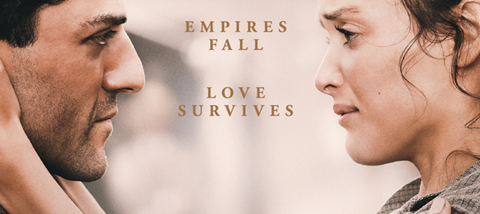
The Armenian genocide is a relatively unexplored period of history and The Promise is the first movie I've ever seen about it.
When I posted about the film on Facebook, many of my friends had never heard of Armenia (one friend even thought I’d mis-typed and meant ‘America’), let alone the genocide that took place at the beginning of the 20th century. After they looked at their maps to see that it lies to the east of Turkey and the north of Iran, they forgave themselves for being so ignorant. They'd never been taught about it in school. Unlike the Holocaust, where the German government admitted responsibility, the Turks have always denied the genocide even took place.
The Armenians, a Christian people living primarily in eastern Anatolia, had long been the subject of Ottoman hostility due to religious and ethnic tensions. In the 1890s Sultan Abdul Hamid II sparked a two year long campaign of violence against the Armenian population of the Empire. The Ottomans, both in official state actions and the actions of state sanctioned mobs, murdered between 50,000 and 300,000 Armenians. They also murdered a large number of Assyrians and other Christian minorities.
Fast forward 20 years to 1914, and the Ottoman Empire (also known as the Turkish Empire) was still decidedly anti-Armenian. When World War I broke out, the leadership carried out their campaign of extermination. Unlike the Holocaust, the Armenian Genocide was not structured. As we see in the film, the killings largely took the form of death marches, as Armenians were forced from their homes and marched through the Empire until they died from starvation and exhaustion. The weakest were shot.
Armenians who weren't killed were either used as slave labour (and then murdered), sold into sex slavery, or forcibly converted to Islam. When the genocide finally ended in 1923, around 1.5 million Armenians had been killed or displaced, the region of Armenia almost entirely purged of its historic people.
The big-budget epic was bankrolled by late billionaire Kirk Kerkorian a businessman of Armenian descent who once owned Metro-Goldwyn-Mayer. He died in 2015 as the film was going into production. The film stars Oscar Isaac, Charlotte Le Bon, and Christian Bale and was directed and co-written by Terry George (who also directed "Hotel Rwanda," a film about the Rwandan Genocide). The Promise follows the story of a love triangle between the Armenians Michael (Isaac) and Ana (Le Bon) and American Journalist Chris (Bale). This love story, spanning over a year or so, is set against the backdrop of World War I and the Armenian Genocide, with the characters both dispersed and reunited by the genocide.
The Armenian genocide is a very important point of history – especially for Christians. But this film is flabby in parts and boring in others. The story deflected from the real horrors that took place. The story line is too linear and lacks twists and turns. The Promise isn't as hard hitting as Schindler’s List but it’s still a compelling historical drama. And I defy you not to cry!
But will this film cause the Turkish government to change their official position (which has remained consistent since 1914) to deny the facts and to reframe the narrative of the genocide? The Turkish government has always framed the events of the Armenian Genocide as the natural consequence of war.
It's a poignant moment to release this film, especially since Turkish President Recep Tayyip Erdogan has just won a referendum to gain more even more powers and his critics are saying he’s trying to revive the Ottoman Empire’s legacy and become the new sultan. He’ll now be able to issue decrees which will be almost impossible for parliament to overturn, while having oversight on budgets, judicial appointments and cabinet assignments. He’ll be able to reshape the NATO ally into the country he envisaged in the early days of his premiership: a republic with Islamist ideals supported by a loyal state apparatus.
Last year Turkey's Islamist government stepped up its war on Christianity by seizing all the churches in one city and declaring them state property. Unlike Christian churches which are maintained by the generosity of their congregations, all mosques in Turkey are state-backed and funded, meaning their futures are secure. A report published earlier this year by the Turkish Association of Protestant Churches warned that persecution and hate speech against Christians of all denominations increased significantly throughout the country in the last year.
If alarm bells are ringing, they don’t appear to be sounding quite so resonantly from the UK government. It’s been far more vocal about the erosion of press freedoms than the protection of Christians.
The Promise will be in UK cinemas from 28th April
To access free resources based on the film please visit csw.org.uk/thepromise
Click here to request a free copy of Premier Christianity magazine





























